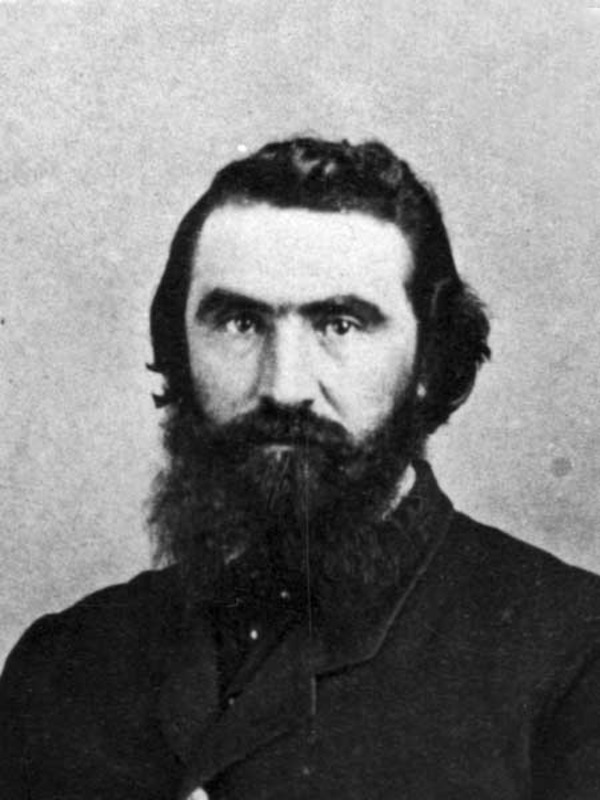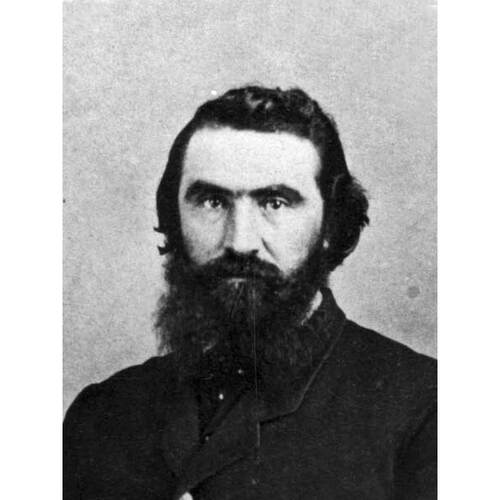
Source: Courtesy of Wikimedia Commons
McKAY (he sometimes signed Mackay), ANGUS (baptized Auguste Augustin), Métis politician and Indian agent; b. 1 Nov. 1836 in Edmonton House (Edmonton, Alta), son of James McKay and Marguerite Gladu; m. Virginie Rolette, and they had seven children; d. 1 Sept. 1910 in Berens River, Man.
Angus McKay’s father, a fur trader, was a native of Sutherlandshire, Scotland, and his mother was of mixed Cree and French Canadian ancestry. A Roman Catholic, McKay appears to have identified with the French-speaking community of his mother rather than that of his English-speaking, Presbyterian father. Like his brother James*, he was fluent in French, English, and several indigenous languages of western Canada.
McKay settled at Red River in the parish of St Charles (Man.) and later in that of St François Xavier, where his home, destroyed by fire in 1874, was described as “undoubtedly the finest in the province.” During the troubles of 1869–70 he was prominent among the group of Métis opposed to Louis Riel*, which became identified as Donald Alexander Smith*’s party. They did not support some of Riel’s tactics for gaining concessions from Canada. Smith, who had been sent to the Red River in December 1869 as special commissioner from the government of Canada to Riel’s provisional government, had left his official documents in Pembina (N.Dak.) as a precaution against their seizure. McKay and two other Métis escorted Richard Charles Hardisty* on his return with the papers to ensure that they reached their owner safely. When the documents were read in public by Smith on 19 Jan. 1870, Riel was forced to recognize the commissioner’s official status. On 10 March McKay and another Métis were arrested by Riel. The Métis leader apparently wanted to prevent them from communicating with Bishop Alexandre-Antonin Taché*, who, he believed, intended to undermine his authority. One of 11 men described by Smith as “Loyal French,” McKay would receive compensation of $250 from the federal government in 1875.
In December 1870 McKay, who had described himself as a “Conservative” since confederation, was elected by acclamation to the Legislative Assembly of the new province of Manitoba as the member for Lake Manitoba. The following year he attended several meetings of the Métis, including one at Riel’s home in St Vital on 6 October. At that gathering he was among those who felt the Métis should respond positively to the proclamation of Lieutenant Governor Adams George Archibald* calling on all men to join forces with the government against a possible Fenian invasion [see William Bernard O’Donoghue*]. In March 1871 he had run for Marquette in a special election to determine Manitoba’s first representatives to the House of Commons. The election resulted in a tie between McKay and Dr James Spencer Lynch, a prominent supporter of John Christian Schultz*. Although both men were declared “returned as elected” to the single member constituency by the house in April 1872 and took their seats (on different days), they subsequently withdrew while the house committee on elections studied the problem. Parliament was dissolved before the committee reported. McKay was not a candidate in the federal general election later that year, but he again obtained his seat in the assembly by acclamation in the election of December 1874.
Probably at the solicitation of Archibald’s successor, Lieutenant Governor Alexander Morris*, McKay resigned from the legislature in December 1876 to make way for his brother James, who would win Lake Manitoba by acclamation the following month. As part of the agreement, Angus received a government appointment; in 1876 he accepted the position of Indian agent for portions of the southern prairies and the Qu’Appelle valley covered in Treaty No.4.
McKay’s career with the Department of Indian Affairs was a stormy one. His reports were often sharply critical of the government’s failure to live up to treaty promises and he passed on the complaints of indigenous people. Officials of the department believed that he incited indigenous people to express dissatisfaction; in 1877, they gave his post to Allan Macdonald and the following year they sent McKay to northern Manitoba, where it was hoped he could do “little or no harm.” Despite his numerous pleas for a transfer he remained the Indian agent in the area covered by Treaty No.5 until 1897. His health declined in the last years of his life, and in 1910 he died of a stroke.
Arch. de la Soc. hist. de Saint-Boniface (Saint-Boniface, Man.), Fonds Picton, dossiers McKay, Rolette. NA, RG 10, B3, 3632, file 6379; 3642, file 7581; 3648, files 8162-1–2; 3742, file 29196; 3784, file 41161; 3806, files 52, 201; 3946, file 123454; 3985, files 172, 596. PAM, MG 3, D1, nos.4, 74, 82, 149, 159, 168, 550, 588, 620; MG 12, B1, corr., nos.57, 993, 1235, 1237, 1395, 1697; B2, corr., nos.42, 51. Begg, Red River journal (Morton). Can., House of Commons, Debates, 1871–72. Canadian directory of parl. (Johnson). CPC, 1872–76. Pioneers of Man. (Morley et al.). J. L. Holmes, “Factors affecting politics in Manitoba: a study of the provincial elections, 1870–99”
Revisions based on:
Ancestry.com, “Manitoba, Canada, baptisms, marriages, and burials, 1834–1959,” Auguste Augustin McKay, 17 sept. 1837: www.ancestry.ca (consulted 13 Nov. 2019). Manitoba Free Press, 8 Sept. 1910. Can., Dept. of the Interior, Annual report (Ottawa), 1876–79, reports of the deputy superintendent general of Indian affairs, continued by Dept. of Indian Affairs, Annual report, 1880–86.
Cite This Article
Sarah Carter, “McKAY (he sometimes signed Mackay), ANGUS (baptized Auguste Augustin),” in Dictionary of Canadian Biography, vol. 13, University of Toronto/Université Laval, 2003–, accessed December 26, 2024, https://www.biographi.ca/en/bio/mckay_angus_12E.html.
The citation above shows the format for footnotes and endnotes according to the Chicago manual of style (16th edition). Information to be used in other citation formats:
| Permalink: | https://www.biographi.ca/en/bio/mckay_angus_12E.html |
| Author of Article: | Sarah Carter |
| Title of Article: | McKAY (he sometimes signed Mackay), ANGUS (baptized Auguste Augustin) |
| Publication Name: | Dictionary of Canadian Biography, vol. 13 |
| Publisher: | University of Toronto/Université Laval |
| Year of publication: | 1990 |
| Year of revision: | 2021 |
| Access Date: | December 26, 2024 |



